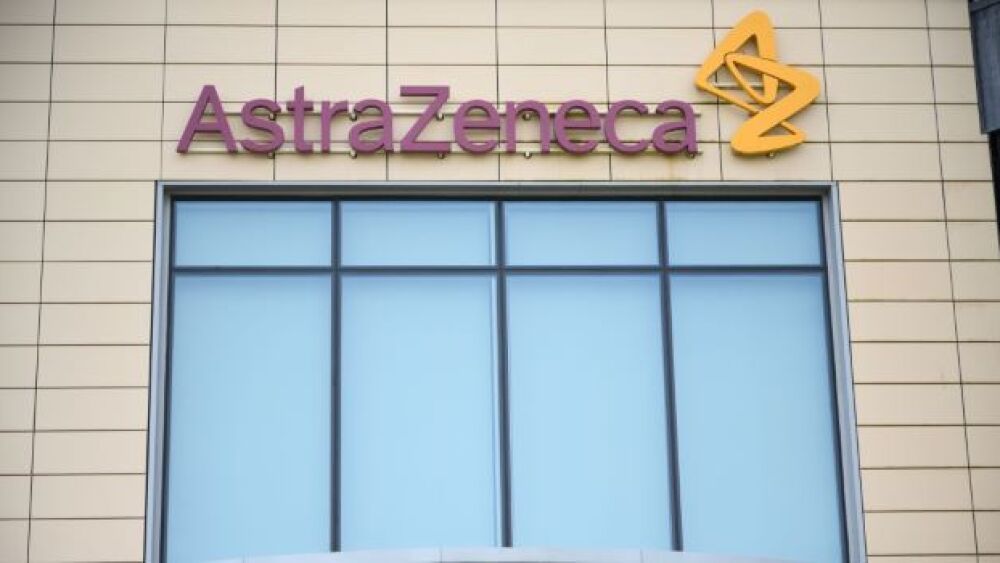AstraZeneca has penned a deal with Harbour Biomed for its bispecific antibody HBM7022, which is intended to eliminate tumors in oncological patients.
Leon Neal/Getty Images
AstraZeneca has penned a deal with Harbour Biomed for its bispecific antibody HBM7022, which is intended to eliminate tumors in oncological patients. The $25 million deal grants AstraZeneca an exclusive global license for the drug’s research, development, registration, manufacturing and commercialization.
The announcement comes just before the American Association for Cancer Research (AACR) annual meeting, at which AstraZeneca is gearing up to present its portfolio of oncology drugs in 60 different sessions. Presentations from the company include data from three experimental medications that address overcoming challenges in treatment, clinical data from its immuno-oncology assets and data from novel molecules that show promising anti-cancer activity and the ability to eliminate tumors from several biological angles.
AstraZeneca is aiming to “transform” the oncology treatment landscape, and HBM7022 is just one of the many drugs the company has scooped up for its ever-growing portfolio. Interestingly, the candidates stem from Eastern sources, pointing towards biopharma’s acknowledgment that countries like China are becoming leaders in oncological technology.
For example, AstraZeneca penned an agreement with HUTCHMED (formerly known as Chi-Med) for its cancer therapeutic savolitinib. In September 2021, the two companies initiated a Phase III clinical trial of the drug to evaluate its efficacy in treating non-small cell lung cancer (NSCLC) in conjunction with osimertinib, one of AstraZeneca’s leading assets. In March 2022, AstraZeneca paid $15 million to HUTCHMED for the clinical milestone.
The company also partnered with Japan-based Daiichi Sankyo in 2019, entering into a global development and commercialization agreement for trastuzumab deruxtecan, an antibody-drug conjugate. The therapeutic, now known as Enhertu, recently made a headline appearance in February 2022 with positive Phase III clinical trial results in the treatment of HER2-low metastatic breast cancer.
March has brought forth other positive news for AstraZeneca’s efforts in treating breast cancer. AstraZeneca and its partner Merck announced that Lynparza, a poly-ADP ribose polymerase (PARP) inhibitor drug, showed an overall survival benefit in patients with early breast cancer. The Phase III clinical trial indicated that the therapy effectively reduced the risk of death by 32% and opened up the possibilities for other oncological indications in which it may be of use.
The U.S. Food and Drug Administration approved Lynparza last month for the adjuvant treatment of patients diagnosed with germline BRCA-mutated (gBRCAm) HER2-negative high-risk early breast cancer, bagging the company a big win in the oncological arena.
Beyond efforts in breast cancer, AstraZeneca also set a new benchmark in the treatment of liver cancer with its Imfinzi-tremelimumab combination therapy. The therapy boosted survival rates in patients with unresectable hepatocellular carcinoma (HCC), a hard-to-treat cancer with low survival rates. The news of tremelimumab’s efficacy was long-awaited as the company faced failures in clinical trials evaluating the drug in NSCLC, bladder cancer and head and neck cancer since it acquired the therapeutic from Pfizer in 2011.
The company, unfortunately, faced a loss in its trials of Imfinzi for the treatment of cervical cancer, with Phase III trials failing to meet the primary endpoint of improving progression-free survival. Nonetheless, AstraZeneca is confident in its oncological and hematological portfolio with heads of the company hoping to “completely replace” previous standards for treatment.





